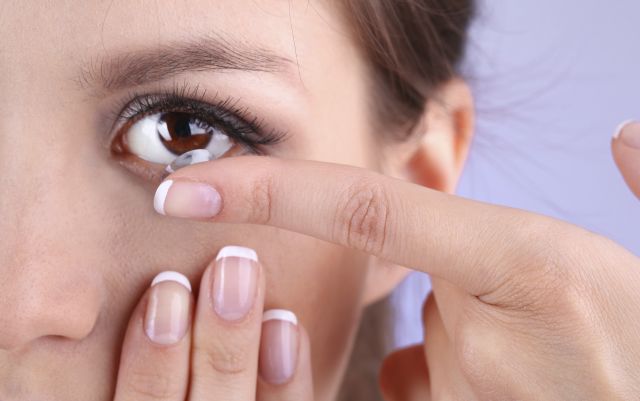Contact lenses are so popular, even grade-school children with fuzzy vision are skipping the specs and choosing contacts. The trend makes it easy to forget that contacts can expose users to some serious vision risks, especially for folks who don’t read the fine print on how to care for lenses safely. And now, a British study is adding another worry to the list. Research from the University of Liverpool shows that bacteria known to cause serious eye infections can survive in contact lens solution much longer than previously thought.
The study, presented at a Society for General Microbiology meeting in Liverpool, England, focused on a type of bacteria that cause keratitis, the most common infection related to contact use. The condition causes inflammation and irritation of the eye’s cornea, which can lead to vision loss and blindness if it’s not treated correctly. Most manufacturers use one strain of these germs when testing how effective their contact lens disinfectant solutions are.
That may not be enough. For the study, the Liverpool team tested how well standard lens solution killed nine different bacteria strains. They found that 10-minute bath in the solution was enough to kill most of the germs, including the strain commonly used for testing. But one particular strain—which happens to cause the most severe cases of keratitis—survived in lens solution for more than four hours.
The researchers say the findings suggest that manufacturers do more testing to make sure their contact solutions are strong enough to kill ALL strains of bacteria that cause microbial keratitis.
Clean lenses equals clear vision
But if you wear contact lenses, what can you do to protect yourself in the meantime? Be extra-diligent about your lens care. The American Academy of Ophthalmology recommends these tips for safely storing, handling and cleaning your lenses:
- Always wash your hands before handling your lenses
- Don’t use tap water to rinse your lenses. Another no-no: Using saliva to rewet a dry contact lens
- To clean your lenses, rub them with your fingers, then rinse them with solution before soaking them. Follow this “rub and rinse” step even if your solution is a no-rub type
- Keep your lens case clean, and replace it at least every three months
- Don’t re-use old solution
- Don’t let the tip of the solution bottle touch any surface
Keep an eye out for these symptoms
And remember, some contact lens-related eye infections can cause serious vision loss or even blindness. If you wear contact lenses and have any of these symptoms of infection, get to your eye doctor right away:
- Blurry vision
- Unusual redness of the eye
- Pain in the eye
- Tearing or discharge from the eye
- Increased light sensitivity
- A sensation that something is in your eye
One more tip: Daily disposable lenses can be a healthy, convenient option for kids (or adults) who have trouble keeping up the consistent, daily routines necessary to safely clean and care for contact lenses. Check with your eye care professional to find out if daily disposables are right for you.






